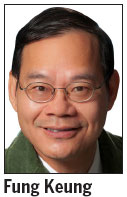Anti-inflation subsidy policy needed
Updated: 2013-04-19 06:14
By Fung Keung(HK Edition)
|
|||||||

One-in-five people in Hong Kong on low income suffer from excessive anxiety because of inflation, a survey has discovered. Inflation is likely to get worse due to climbing prices of daily necessities and a strengthening yuan.
The condition suffered by many low-income people is known as generalized anxiety disorder. Sufferers can easily develop depression and suicidal thoughts and behavior.
The government can implement a policy to stop this impoverished group from living in misery or killing themselves. The simplest way is to set up an anti-inflation policy to subsidize these people and help them fight surging prices of daily foodstuffs and necessities.
The government's bulging reserves, plus possible savings from government medical expenditure incurred by citizens suffering from generalized anxiety disorder, can help set up such a life-saving anti-inflation subsidy policy in no time.
The Mood Disorders Center of the Chinese University of Hong Kong surveyed 5,000 people and found that 84 percent of people in the city are affected by inflation to varying degrees. The center's director, Professor Lee Sing, said those with household incomes of less than HK$10,000 a month are the most likely to suffer from generalized anxiety disorder.
Inflation in the city is running at 4.4 percent, compared with 2 percent in 2006. A report by the Consumer Council in Hong Kong, released on Monday, stated that supermarket prices in the city have risen by an average of 6.8 percent over the past 12 months. Professor Hui King-man, chairman of the Consumer Council's publicity and community relations committee, called on supermarket owners to maintain "reasonable prices" to help the public cope with inflation.
An academic from Hong Kong Baptist University commented that Hong Kong's supermarket chains may have increased their pricing power, to the detriment of consumers. Business is business. When prices of goods from the mainland go up, supermarkets have no choice but to raise prices.
There is no sign of slackening, however. The yuan reached a record high on April 12. The mainland currency jumped to reach 6.2506 yuan to $1, up from the previous day's 6.2578 yuan. A stronger yuan means we have to pay more in Hong Kong dollars to purchase the same amount of products from the mainland. Rising prices are the roots of inflationary pressure.
The low-income group in Hong Kong deserves our help as the income gap between rich and poor continues to widen. A recent study by Ipsos Media Atlas found that Hong Kong's poorest 20 percent take up just 6 percent of society's income share while the rich take up 43 percent. The average monthly household income for the bottom tier increased by only 2 percent over the past four years, while the top tier saw theirs rise by 10 percent, the Ipsos study discovered.
The proposed anti-inflation policy can help this low-income group enjoy a more decent life. Poverty has made it harder for this group to climb the social ladder. The study has found that many people in this group couldn't afford to own smartphones or laptop computers, tools that are deemed essential in hunting for better jobs. Only 25 percent of this group owns a laptop, compared with the 43 percent average.
Being poor also affects self-confidence, and lack of confidence is a psychological drag in getting ahead. The survey found that more than 60 percent of the bottom tier did not believe they would achieve their goals in life.
Hong Kong is rich. Hong Kong's Financial Secretary John Tsang Chun-wah revealed on Feb 27 that the city recorded HK$64.9 billion fiscal surplus in the year ending March 31. The government is well-advised to set up the anti-inflation policy immediately. Wealthy people of Hong Kong, please have a heart! The low-income group deserves to enjoy the fruits of our city's success.
The author is coordinator of the B.S.Sc in financial journalism program at Hong Kong Baptist University.
(HK Edition 04/19/2013 page1)